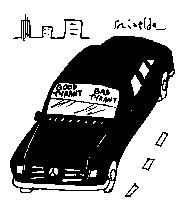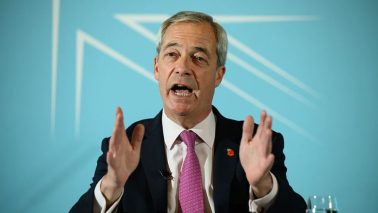When the United Nations sanctioned the use of force against Colonel Gaddafi, it could not quite bring itself to use the word force. The word force is, well, forceful. It suggests ruthlessness. Force is something that gets things done, and those in its way tend to get swept aside. The German word is Macht, and we have all heard about that. A powerful waterfall close to where I grew up in the north of England is called ‘High Force’; you only have to go there in springtime to witness the literalness of that name.
The West has never had more force at its disposal, while being oddly squeamish about deploying it. One may wish world affairs to be decided by diplomacy and overseas aid, but as the Libyan episode shows, there are times when there is no substitute for force. For all the theories about ‘soft power’, most force (and power) remains hard, material and, yes, military. The West has always known this. But it goes through phases of being reluctant to admit it.
Using force did not trouble decision-makers of earlier societies, the Persians, the Romans, the Huns, Frederick the Great, the British in India. But just over a century ago, this stern sense of realism began to weaken, becoming softer and conscience-stricken. Liberals like Gladstone and his devoted American follower Woodrow Wilson preached the merits of mutual human tolerance, the abolition of weapons of mass destruction or mass starvation (the blockade, poison gas), the coming together of the nations of the world.
The Wilsonian dream, encapsulated in a League of Nations that America never entered, lasted a mere 12 to 15 years before the dictator-states booted it into the dustbin of history. But when those dictator-states overreached themselves by their fateful aggressions of 1938 to 1941, they were kicked into the same dustbin; and it is hard to find anyone among the policymakers, opinion-writers and general publics of the victor nations of the second world war who did not think that using massive military force — including, more than ever, massive air force on the enemy homelands — was not well justified. After 1945 the international community lurched back onto the Wilsonian track, partly in well-justified fear of what the new A-bombs might mean in a future war and partly because it was hard to believe that the evils of (especially) Nazi Germany could ever be repeated. Still, what if there were future acts of aggression by one state against another? What if an evil regime committed dire atrocities against its citizens, especially minorities? Could those who had just defeated Hitler, Mussolini and Tojo stand back? No. The result was the Charter of the United Nations. It is not an easy document, and students I have taught and advised at Yale, Cambridge and the LSE have complained passionately about its contradictory nature.
Of course they should complain, but that is because they do not yet understand what its founders were trying to do. Its text reflected a natural tension in 1945 between a yearning for a world order under the rule of law on the one hand, and the prickly sensitivity of sovereign nation-states (especially the mightier ones). It urges a better world, but it is not a pacifist document because it gives the UN Security Council massive powers under Chapter VII to ‘spank’ an identified aggressor and keep on spanking — provided there are clear majorities on the council, and the original decision is not overturned.
Nor can it ever be said that the Charter is a totally universal document, some latter-day Ten Commandments brought down the mountain. It is very much a western product. All the players (especially Russia and China) know that — and they all act accordingly. This is the game that was played out last week, and is the backdrop to the current situation in Libya.
Which brings us back to the issue of ‘force’. Military force certainly works, and has already made much progress punishing Gaddafi’s Libya. But nowadays, force is exercised in an atmosphere of uncertainty, foreign suspicion, and domestic guilt. When Churchill repeatedly warned that he would punish the Germans for their slavish adherence to Hitler, most of the British population applauded (as did, even more, those countries occupied by the Nazis). Nowadays, the notion of brute force is regarded as tasteless, antediluvian, idiotic, counter-productive, and morally wrong. So today’s military actions need to be clothed in the language of collective security, international consensus and regard for all manner of sensitivities.
But western high-tech ‘hard power’ is a very real and effective thing. It will be a long time before the full effect of last week’s attacks are known. Some serious setbacks may yet be to come — ‘frictions’ in war happen, as Clausewitz reminds us. But it is hard not to be impressed by the sheer willingness and capacity of the French air force to inflict pain on Gaddafi’s hoodlum army, or at how quickly the miserable Libyan air force (so good at bombing its own helpless civilians) folded its cards. Also impressive is the capacity of British and American submarines to launch 124 Tomahawk missiles from the sea onto pinpointed Libyan military targets. And in the background, one suspects, some nifty US planes are enjoying disrupting enemy communications.
So Gaddafi’s own use of force — his deranged, furious attacks on his own citizens for their pursuit of freedom — has backfired in both a moral and a practical sense. Yet, crucially, the Allied assaults have probably done much more than that. They have reminded some of the other big players in world affairs that hard power counts, but they still do not have it. The French are putting an aircraft-carrier off the Libyan coast. The RAF can fly (with re-fuelling) from East Anglia to Benghazi, and back. The Americans can watch over the whole electronic super-game. Frankly, if I were a strategic planner in China, Russia or India right now, I would be most thoughtful — and, perhaps, a little desperate — about when one might ever catch up.
This gives us some idea what to expect next. The non-American-Anglo-French world will want to curb this return to ‘force’ in international affairs. The UN Security Council vote last week was a marvellous measure of this panoply of viewpoints. Britain, France and the United States were joined by seven of the two-year rotating members, including, and this is hugely interesting, those from Africa and the Middle East. Russia and China, both hating American world influence and fearing some future UN interference in their own domestic discontents, abstained rather than vetoed, which they probably now regret. The German foreign minister, deploying the limpest of reasons, daily defends his own country’s abstention vote, not seeing that his position will provoke the old ‘economic giant but military pigmy’ jeers. And the Brazilian and Indian abstentions, presumably out of a pique at not being permanent members of the Security Council, were in my view a gross miscalculation. One doubts if they have improved their chances for getting on the Council permanently — who wants four ‘spoilers’ when China and Russia already do a fine job of blocking so much UN peacekeeping and peace-enforcement?
The UN resolution on Libya, authorising all necessary military force bar ground troops, was more extensive than most observers thought likely. The next few days and weeks will see efforts by various governments to rein in the military efforts, assisted no doubt by Tripoli’s efforts to ensure that as many of its civilians as possible will be killed by Allied fire. One doubts if Sarkozy and Cameron will agree to back off, so long as there is evidence that Gaddafi is crushing his opponents by other means. Whether the ultra-cautious Obama will stay the course may be less certain. With McCain and other co nservatives deriding his indecision, there is little political capital for him whatever he decides.
To America’s friends abroad, this gets even more confusing: did the world not applaud Obama’s evident thoughtfulness and wish for a ‘kinder, gentler presidency’ than George Bush’s? But does the world not also worry when American leadership is so reticent? However this all unfolds, it again has highlighted a deep — and dangerous — ambivalence about the use of force in international affairs. Most of us want to see evildoers halted in their tracks, and punished. But many people also worry about having to apply the punishment themselves, or having others do it. Machiavelli would have groaned. But we, in our century, just have to get used to it.






Comments